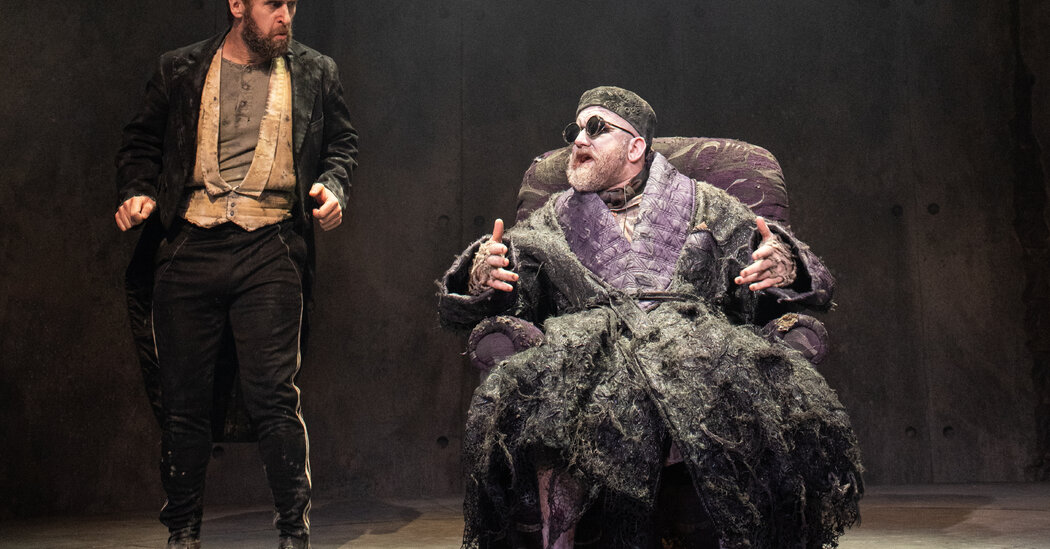The room looks like a brutalist bunker — all tall, curving concrete walls with spare, circular windows way up high. Outside are land and sea, destruction and desolation. People, barely any.
It’s vicious out there for a human, but it’s vicious inside, too, where the tempestuous Hamm holds court from his grungy recliner, wearing a purple-trimmed robe that had grandeur to it once, before it went to seed.
Unable to walk, unable to see, he blows on the whistle around his neck to summon his rebellious servant, Clov, who is also his chief courtier.
“You pollute the air!” Hamm snarls, as a conversation opener, and still it’s awfully good to be in their company — both the bickering cohabitants of Samuel Beckett’s “Endgame,” and the fine, funny artists of Garry Hynes’s venerable Druid troupe, back in New York, this time at Irish Arts Center in Hell’s Kitchen.
We’re having something of a Beckett profusion this season, with the Keanu Reeves-Alex Winter “Waiting for Godot” on Broadway, and Stephen Rea recently in “Krapp’s Last Tape” downtown. But it isn’t an overload, certainly not with Druid in the mix. Their unprecious “Godot,” in 2018, was a comic delight; Aaron Monaghan, who played Gogo in that production, is this one’s shuffling, clownish Clov, while Rory Nolan, Pozzo in that “Godot,” is the preening, mercurial Hamm.
Language is the plaything of Hamm and Clov, and of Hamm’s parents, too: Nell (Marie Mullen) and Nagg (Bosco Hogan), who pop up now and again from the trash cans over to the side, dressed in their nightclothes and lit with a beguilingly unearthly glow. (Set and costume design are by Francis O’Connor, lighting by James F. Ingalls.)
All of them share the human desire, in us since babyhood, to retell and rehear the same tales again and again, nettling and bantering in the old familiar manner. It’s how they pass their days.
“Shall I tell you the story of the tailor?” Nagg asks Nell, who has heard this joke countless times since he first regaled her with it on Lake Como, the day after they got engaged.
She tells him, “No.” And then inquires: “What for?”
He says, “To cheer you up.”
That’s about as tender an offer as one person makes to another in “Endgame,” whose characters are mired together in bleak circumstances that seem to have the upper hand, as their supplies peter out and their prospects darken. Are they trapped here? Some of them, surely. Are they kind to one another? Not all that often.
But as Nell deadpans, “Nothing is funnier than unhappiness, I grant you that.” And as much as this motley foursome finds comfort in repetition and pleasure in the resulting variations, so do we. It’s part of why we revisit plays, whose text immerses us in ritual that is both the same and different each time. Counterintuitive as it might seem, there is something soothing about peering into the warped world of “Endgame,” given the tumult of ours.
Mullen makes a movingly haunted Nell, whose brief stage time we feel all too keenly. (We feel a bit of history as well. In 1998, when Hynes became the first woman to win a best director Tony Award, for “The Beauty Queen of Leenane,” Mullen won a Tony for starring in it.)
Hogan’s Nagg, companionable with Nell, is also wonderfully vengeful, repaying their cruel and imperious son with contempt, and spinning fantasies of denying him what he craves most: the attention of a listener.
For Hamm, a captive audience is what Clov has always been, however frequently he threatens to leave. Monaghan brings a wry pep to Clov’s downtroddenness, and a stricken look to his resting expression.
“There’s one thing I’ll never understand,” Clov says. “Why I always obey you. Can you explain that to me?”
Perhaps it’s the state of our own world, but never have I rooted so hard for Clov to stop doing Hamm’s bidding, stop indulging his whims and vanity.
“I’m tired of our goings on, very tired,” Clov says.
I have seen this play before, I know how it ends and still — the repetition is the thing. I want to watch Clov make that exit, taking a chance on whatever awaits, leaving this misery behind.
Endgame
Through Nov. 23 at Irish Arts Center, Manhattan; irishartscenter.org. Running time: 1 hour 25 minutes.
The post Review: In Samuel Beckett’s ‘Endgame,’ Repetition Is the Thing appeared first on New York Times.




